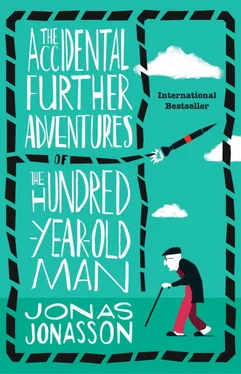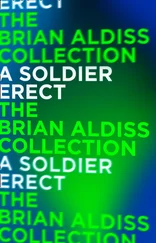1 ...7 8 9 11 12 13 ...79 ‘That would put both our cargo and my life in jeopardy. If you behave yourselves, you may accompany us to the Democratic People’s Republic.’
‘If we behave ourselves?’
‘Exactly. There, the Supreme Leader will take care of you in the best way possible.’
‘The way he took care of his brother not long ago?’ Allan asked.
Julius swore internally. Couldn’t the old man control himself? Did he want to become shark food?
Captain Pak might not have had a black tablet like Allan’s, but he did have access to news from all corners of the world as long as he was at sea. He was aware of the accusations in the international media and said angrily that Mr Karlsson had clearly allowed himself to be taken in by imperialist propaganda. ‘ No Korean leader would kill either relatives or visitors from other countries.’
For one second, Julius entertained the vain hope that the hundred-and-one-year-old would back down. When that second had passed, Allan said: ‘Oh yes they would. The only reason I’m sitting here today is that Mao Zedong saved my life a few years back, when Kim Il-sung intended to have me shot. As it happens, Mao himself had a change of heart at the last moment.’
What was Captain Pak Chong-un hearing? So much was wrong, all at the same time. A Caucasian blaspheming the name of the Eternal President of the Republic. The president who had stepped into said eternity twenty-three years previously.
‘A few years back?’ said Captain Pak, waiting for his thoughts to fall into order.
‘Oh, time flies. It was 1954, I think. When Stalin was putting on airs. Or was it ’fifty-three?’
‘Mr Karlsson, you… met the Eternal President of the Republic?’
‘Yes, him and his angry boy both. But, of course, they’ve both sailed on since then – not everyone can simply grow healthier with age, like me. Aside from my memory, that is. And my hearing. And my knees. And something else. I’ve forgotten – the memory part, you know.’
Captain Pak realized that the risk to his own life was not at all in the past. The man before him might constitute a direct threat to his health. For him to bring someone who might possibly have denigrated the Eternal President to Pyongyang could not reasonably lead to anything other than… other than what the imperialists claimed had afflicted the Supreme Leader’s brother.
Then again: to take the life of someone who had sat down with the Eternal President without first double-checking with that leader’s grandson…
Rock or hard place? Captain Pak weighed his options.
Julius was, to his own surprise, still conscious. Did Allan understand how high the stakes were, or was he just old? Whichever it was, the hundred-and-one-year-old had talked himself into a state in which the captain’s threat to throw them overboard was more topical than ever.
Julius considered how he might salvage the situation and heard himself saying, ‘Allan here is a great champion of freedom for the Democratic People’s Republic. And an expert in nuclear weapons, too. Isn’t that right, Allan?’
Captain Pak stopped breathing for a few seconds. He automatically brought his right hand to the safe key around his neck to make sure it was still there. A nuclear weapons expert? he thought.
Allan was thinking the same thing. He was afraid he had played a little too offensively against the suspected teetotaller across the table. And, as things were, it was best to play along with the make-believe his friend had started. ‘That was kindly put, Julius. Yes, I suppose we’re experts just about to a man, but in different areas. My speciality happens to be slapping together what we called atom bombs in the good old days. I’m almost as good at that as I am at making vodka out of goat’s milk. But, as I’ve understood it, vodka won’t win me any points on this ship. And, anyway, I don’t suppose there are any goats aboard.’
Allan noticed the captain’s hand seeking something around his neck whenever nuclear weapons were mentioned. That might, of course, have been mere chance. Or perhaps it explained somehow why he looked so tormented. The hundred-and-one-year-old had done some reading on the North Korean atomic weapons programme. Why, just a few days earlier, Kim Jong-un had sent a missile over the Sea of Japan, provoking fury from the rest of the world. This had prompted the old dynamiter to update himself via the black tablet, where you could read absolutely anything if you only knew where to look.
It turned out a lot had happened on the atom bomb front in the seventy-plus years since Allan had last had reason to delve into the topic. But the North Koreans seemed to be far from leaders in the field. ‘Beginners’ would be a better word. International pundits guessed that the country’s plutonium facilities hadn’t yet succeeded in delivering what they were meant to.
Should Allan mention this to the captain and see what sort of reaction he got? With a tiny promise embedded to be on the safe side? His and Julius’s options were no longer to be let off in Indonesia or North Korea, if they ever had been. Instead they would be let off in North Korea or tossed over the railing. North Korea sounded more pleasant. ‘Like I said, nuclear weapons and I are the best of friends. And you seem to have plenty of problems.’
Captain Pak’s hand immediately went back to the key.
Allan went on: ‘Judging by the puny strength of your country’s first nuclear weapons tests, either you haven’t quite figured out plutonium production or you have a severe lack of uranium. Or maybe both. One issue, when it comes to uranium, might be that you don’t understand how to maximize it. That’s what usually happens to nuclear weapons bunglers in general. No wonder people are laughing at you.’
‘Who’s laughing at us?’ Captain Pak said defensively.
‘Who isn’t?’ Allan said, and Julius prayed silently to himself that Allan would stop there.
But Allan had caught a scent. The captain wasn’t protesting at Allan’s account of things: instead he was lamely arguing about the laughter . Had Allan hit the mark more accurately than he could have guessed? ‘Uranium,’ he said, feeling his way forward.
That was it. Nothing more. And once again.
‘Uranium.’
Now the captain’s hand, clutching the key, almost turned white.
‘Why do you keep saying uranium all the time?’ he asked angrily and uncertainly all at once.
‘Because anyone who has two plutonium facilities at their disposal and still shoots off toy bombs likely has a problem. Anyone who can’t produce their own plutonium must seek solace in – you guessed it – uranium.’
Captain Pak tried to bring his hand to the key again, only to discover it was already there. Allan told the captain not to look so terrified. Surely it was no surprise that the world’s leading nuclear weapons expert, all humility aside, would understand the situation.
One person who didn’t was Julius. Had Allan become a mind-reader?
‘What situation?’ said Captain Pak, fearing the answer.
Allan was on the verge of betting that the captain’s boat was full of smuggled uranium. But if he was wrong, matters would deteriorate. ‘Let’s not spend too much time on the obvious,’ he said. ‘This sort of thing is best dealt with discreetly. But the captain will have to make his decision soon. Either Julius and I will come to Pyongyang and whip your puny attempts at nuclear weapons into shape. Or you will have to throw us overboard and justify it to the Supreme Leader after the fact.’
Captain Pak wanted to bury the two gentlemen a few thousand metres below the sea. At the same time, the older one knew so much. Perhaps more than the republic’s own experts. How patriotic would it be to feed the fish with all that knowledge?
Читать дальше
Конец ознакомительного отрывка
Купить книгу












